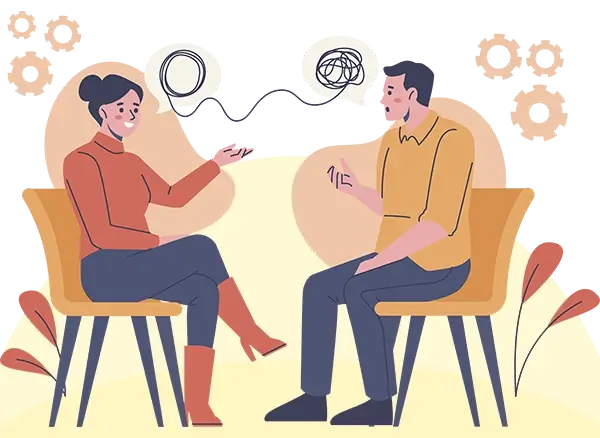Learn whether you may be living with PTSD with this expert-reviewed test. After receiving your results, you’ll have the opportunity to learn more about your symptoms and talk to a licensed therapist.
This mental health assessment is not a diagnosis or a substitute for licensed therapy. For more information on how to get scheduled with a qualified mental health professional, read our guide here.
Over 70% of people will experience a trauma at some point in their lives. Of that, only around 5-6% go on to develop PTSD—Post-Traumatic Stress Disorder. So how do you know if you have PTSD? This test is not a substitute for an official diagnosis or mental health treatment. Instead, it is meant to be a temperature gauge and assess the likelihood that you have PTSD, c-PTSD, or a similar trauma disorder. These 10 questions are pulled directly from the DSM-5 criteria for PTSD and are therefore a good tool to understand your behaviors, emotions, and reactions. Remember, PTSD is a complex disorder that cannot be summed up by these 10 questions.
Begin Test
PTSD is characterized by hypervigilance, intrusive thoughts and memories, and avoidance of triggering stimuli. People with PTSD may feel like they’ve changed or the world has changed irreversibly. This, paired with an increase of anxiety, depression, and social withdrawal, can make PTSD highly impairing.
PTSD is caused by a highly distressing traumatic event. It cannot be diagnosed without the presence of an event (or series of events, in the case of chronic trauma.) Some causes of trauma include natural disasters, accidents, illness, death of a loved one, abuse or assault, childhood neglect, poverty, and many more.
Up to 40% of people recover from PTSD within 1 year, with many more recovering within a few years. This is usually with the help of treatment, either therapy, medication, or a combination of both. Talk therapy has been proven effective at treating PTSD, and medication can help address co-morbid issues like anxiety and depression. For more severe forms of PTSD, other therapies like EMDR are a good option.
Remember that this assessment is not a substitute for a licensed mental health professional screening you for PTSD. You may have experiences that align with PTSD but are out of the scope of this short test. Therefore, it is wise to always seek an outside, professionally licensed opinion in addition to this test.
3.9% of the world population is living with PTSD. Of these, many will go on to make full recoveries with the help of their loved ones, therapists, and other mental health professionals. You are not alone.
Find a Therapist

Common signs of PTSD (Post-Traumatic Stress Disorder) include:
Intrusive memories: Flashbacks, nightmares, or upsetting thoughts related to the trauma.
Avoidance: Avoiding reminders of the trauma, such as people, places, or conversations.
Negative changes in thinking and mood: Feelings of hopelessness, memory problems, or feeling disconnected from loved ones.
Changes in physical and emotional reactions: Being easily startled, feeling tense, or having angry outbursts.
Persistent emotional distress: Ongoing feelings of guilt, shame, fear, or sadness connected to the trauma.
If you experience these symptoms, take this free, online PTSD test. It can give you a better idea on how severe your symptoms are and if seeking therapy is a good idea for you.
It depends on the severity and complexity of the trauma experienced. Astute trauma, like a car accident, usually lasts shorter than more complex traumas like child abuse or a long abusive relationship.
In general, PTSD can last for months, years, or even a lifetime if not treated. Some people recover within a few months, while others may have ongoing symptoms. Treatment, including therapy and medication, can greatly reduce symptoms and improve daily life.
No, a free test cannot give an official diagnosis of PTSD. However, online screenings or self-assessments can help identify potential symptoms and suggest whether you should get a professional evaluation. Only a licensed mental health professional can diagnose PTSD.
A PTSD rating is used to determine a veteran’s disability compensation rate. A 70% PTSD rating from the U.S. Department of Veterans Affairs usually indicates severe problems in work and social situations. This can include:
Frequent panic attacks or depression
Difficulty maintaining relationships or jobs
Impaired judgment or thought processes
Suicidal thoughts
Each case is assessed individually based on symptoms and their effect on daily life.
Trauma therapy can help those who struggle with severe PTSD.